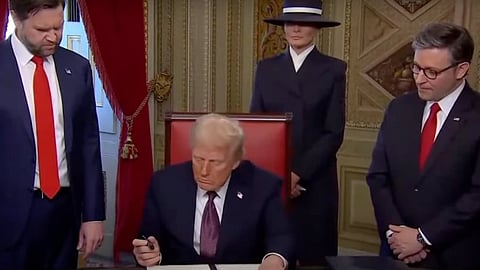

President Donald Trump declared a national energy emergency and issued an executive order for the United States (U.S.) to withdraw from the Paris climate agreement.
This order is a main part of Trump's plan to increase fossil fuel production.
"The inflation crisis was caused by massive overspending and escalating energy prices, and that is why today I will also declare a national energy emergency. We will drill, baby, drill," said Trump during his inaugural address.
During his campaign, Donald Trump pledged to reduce energy costs by half within the first year of his administration.
Trump's order directs federal agencies "to identify and exercise any lawful emergency authorities available to them" to expand the leasing, siting, production, and generation of energy sources, including on federal properties.
"The national energy emergency is crucial because we are in an AI race with China, and our ability to produce domestic American energy is so crucial such that we can generate the electricity and power that's needed to stay at the global forefront of technology," a White House official told the media.
Trump is ending the Biden administration's domestic and international commitments connected to climate change.
According to Trump's executive order, the U.S. would consider its withdrawal from the Paris climate agreement to be effective as soon as the U.N. ambassador submits the notification to the United Nations.
In response to former president Joe Biden's executive orders prohibiting oil and gas drilling in regions of the Arctic and along U.S. coastal waters, Trump signed executive orders to reverse these actions.
These actions are likely to be challenged in the courts.
President Trump also reversed the Biden administration's targets for half of all new car sales to be zero-emission vehicles by 2030.
This was part of the Biden administration's efforts to achieve a carbon-free electricity sector by 2035 and net-zero by 2050.
